
The Ibizan Hound is a lean, agile dog of the hound family. There are two hair types of the breed: smooth and wire. The more commonly seen type is the smooth. Some consider there to be a third type, long, but the longhair is most likely a variation of the wire.

A dog breed is a particular strain of dog that was purposefully bred by humans to perform specific tasks, such as herding, hunting, and guarding. Dogs are the most variable mammal on earth, with artificial selection producing around 450 globally recognized breeds. These breeds possess distinct traits related to morphology, which include body size, skull shape, tail phenotype, fur type, body shape, and coat colour. Their behavioural traits include guarding, herding, and hunting, and personality traits such as hypersocial behavior, boldness, and aggression. Most breeds were derived from small numbers of founders within the last 200 years. As a result, today dogs are the most abundant carnivore species and are dispersed around the world.

The American Kennel Club (AKC) is a registry of purebred dog pedigrees in the United States. In addition to maintaining its pedigree registry, this kennel club also promotes and sanctions events for purebred dogs, including the Westminster Kennel Club Dog Show, an annual event which predates the official forming of the AKC, the National Dog Show and the AKC National Championship. The AKC is a non-member partner with the Fédération Cynologique Internationale.

The Border Collie is a British breed of herding dog of medium size. They are descended from landrace sheepdogs once found all over the British Isles, but became standardised in the Anglo-Scottish border region. They are now mostly used as working dogs to herd livestock, specifically sheep.
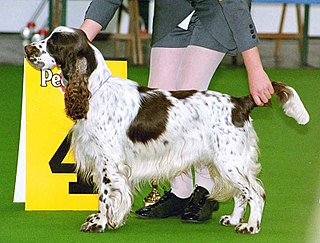
A dog show is an event where dogs are exhibited. A conformation show, also referred to as a breed show, is a kind of dog show in which a judge, familiar with a specific dog breed, evaluates individual purebred dogs for how well the dogs conform to the established breed type for their breed, as described in a breed's individual breed standard.
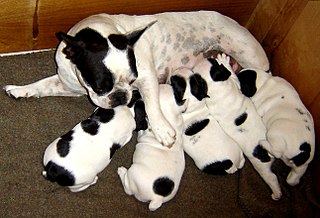
Dog breeding is the practice of mating selected dogs with the intention of maintaining or producing specific qualities and characteristics. When dogs reproduce without such human intervention, their offspring's characteristics are determined by natural selection, while "dog breeding" refers specifically to the artificial selection of dogs, in which dogs are intentionally bred by their owners. Breeding relies on the science of genetics, hence a breeder who is knowledgeable on canine genetics, health, and the intended purpose of the dogs attempts to breed suitable dogs.
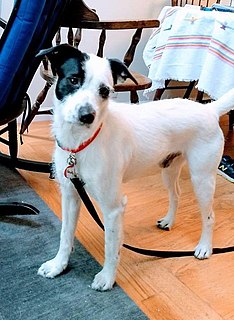
A mongrel, mutt or mixed-breed dog is a dog that does not belong to one officially recognized breed and including those that are the result of intentional breeding. Although the term mixed-breed dog is sometimes preferred, many mongrels have no known purebred ancestors. Crossbreed dogs, and "designer dogs", while also a mix of breeds, differ from mongrels in being intentionally bred. At other times, the word mongrel has been applied to informally purpose-bred dogs such as curs, which were created at least in part from mongrels, especially if the breed is not officially recognized.
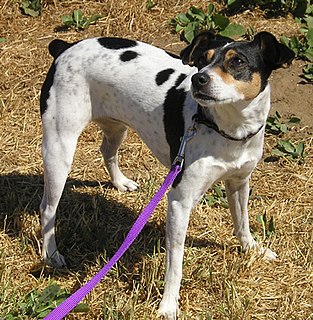
The Rat Terrier is an American dog breed with a background as a farm dog and hunting companion. They share much ancestry with the small hunting dogs known as feists. Common throughout family farms in the 1920s and 1930s, they are now recognized by the United and American Kennel Clubs and are considered a rare breed. Today's Rat Terrier is an intelligent and active small dog that is kept both for pest control and as a family pet.

Crufts is an international dog show held annually in the United Kingdom, first held in 1891. Organised and hosted by The Kennel Club, it is the largest show of its kind in the world.
Toy dog traditionally refers to a very small dog or a grouping of small and very small breeds of dog. A toy dog may be of any of various dog types. Types of dogs referred to as toy dogs may include spaniels, pinschers and terriers that have been bred down in size. Not all toy dogs are lap dogs.

The Greater Swiss Mountain Dog is a dog breed which was developed in the Swiss Alps. The name Sennenhund refers to people called Senn or Senner, dairymen and herders in the Swiss Alps. Greater Swiss Mountain Dogs are almost certainly the result of indigenous dogs mating with large mastiff-type dogs brought to Switzerland by foreign settlers. At one time, the breed was believed to have been among the most popular in Switzerland. It was assumed to have almost died out by the late 19th century, since its work was being done by other breeds or machines, but was rediscovered in the early 1900s.

The United Kennel Club (UKC) is a kennel club founded in 1898 in the United States. In contrast with the American Kennel Club, which is non-profit and which only clubs can join, the United Kennel Club is a profit-making corporation, open to individuals.
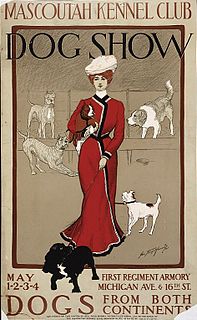
A kennel club is an organization for canine affairs that concerns itself with the breeding, showing and promotion of more than one breed of dog. Kennel clubs became popular in the mid 19th century. All-encompassing kennel clubs are also referred to as 'all-breed clubs', although "all" means only those breeds that they have decided to recognize, and "breed" means purebred dogs, not including dog hybrids and crossbreeds or mixed-breed dogs. A club that handles only one breed is known as a breed club.
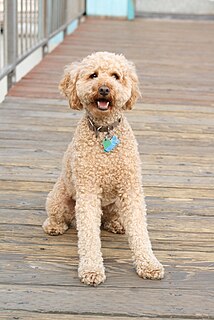
Dog crossbreeds, sometimes called designer dogs, are dogs which have been intentionally bred from two or more recognized dog breeds. They are not dogs with no purebred ancestors, but are not otherwise recognised as breeds in their own right, and do not necessarily breed true.
A breed registry, also known as a herdbook, studbook or register, in animal husbandry and the hobby of animal fancy, is an official list of animals within a specific breed whose parents are known. Animals are usually registered by their breeders while they are young. The terms studbook and register are also used to refer to lists of male animals "standing at stud", that is, those animals actively breeding, as opposed to every known specimen of that breed. Such registries usually issue certificates for each recorded animal, called a pedigree, pedigreed animal documentation, or most commonly, an animal's "papers". Registration papers may consist of a simple certificate or a listing of ancestors in the animal's background, sometimes with a chart showing the lineage.

The French Spaniel is a breed of dog of the Spaniel-like setter. It was developed in France and Canada as a hunting dog, descended from dogs of the 14th century. Popular with royalty during the Middle Ages, it nearly became extinct by the turn of the 20th century but was saved by the efforts of Father Fournier, a French priest. One of the largest breeds of Spaniel, it typically has a white coat with brown markings. It is a friendly breed that has few health issues, but can be affected by a syndrome called acral mutilation and analgesia. The breed is recognised by Canadian and international kennel clubs but not by The Kennel Club (UK). The American Kennel Club has included the breed in its Foundation Stock Service, the first step to full recognition.
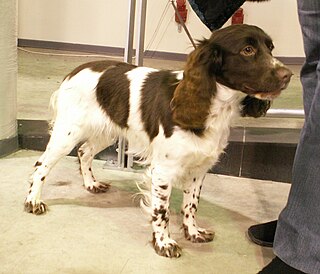
The Russian Spaniel is a type of spaniel first standardised in 1951 in the Soviet Union after World War II by cross breeding English Cocker Spaniels, English Springer Spaniels and other spaniel breeds. In 1951, the standard of the Russian spaniel was adopted, the selection of dogs for breeding began to be carried out in accordance with the requirements. Physically it is similar to a Cocker Spaniel, but has a shorter, tighter coat and a longer body. Developed and used as hunting dogs, this breed does not suffer from any major health complaints other than those normally associated with spaniels. It is the only gun dog breed originated in Russia. It is used for hunting game birds and hares. Popular in its native Russia, the breed was only introduced overseas in the 1990s, and is not yet recognised by any major kennel clubs, but is recognised by Russian Kynological Federation.

Championships are awarded to dogs who have passed through a process of selection at dog shows. Traditionally, a championship was received at a conformation show, but championships are now offered for dogs who have attained a high degree of perfection in other dog sports as well.

The American Bully is a modern breed of dog that was developed as a companion dog, and originally standardized and recognized as a breed in 2004 by the American Bully Kennel Club (ABKC). Their published breed standard basically describes the dog as giving the "impression of great strength for its size." In 2008, the American Bully was recognized by the European Bully Kennel Club (EBKC), and on July 15, 2013, by the United Kennel Club (UKC). Neither The Kennel Club nor American Kennel Club (AKC) have recognized or accepted the American Bully into their registry as a purebred dog. The founding registry (ABKC) divided the American Bully into four categories, including the Pocket, Standard, Classic, and XL, whereas other registries, including the UKC, have approved one consistent size standard.
Fred Lanting is a multi-breed American Kennel Club (AKC) judge, United Kennel Club (UKC) all breed judge and handler as well as other show organizations in the U.S. and abroad. He is best known for being the author of "The Total German Shepherd Dog" and "Canine Hip Dysplasia and Other Orthopedics Disorders". He also tours the world conducting lectures and seminars on canine health as well as judging UKC, Sieger, and other registry shows.

















